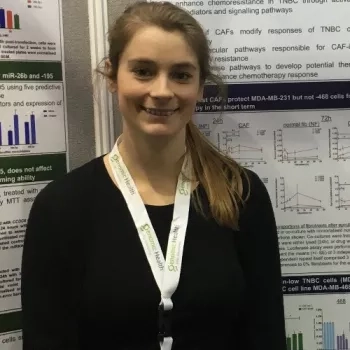Characterizing the Tumor Microenvironment through Immunophenotyping and Spatial Biology using Ultivue 8-plex Immunofluorescence Technology on the BOND RX Research Stainer

Multiplex immunofluorescence (mIF) assays offer the advantage of preserving the architectural features of the tumor microenvironment and revealing the spatial relationships between tumor cells and immune cells that are present.
Using custom-designed Ultivue 8-plex kits on the BOND RX system by Leica Biosystems, it enables the definition of the T cell phenotypes spatially and quantitively. This is especially important in treatment response monitoring and TME infiltration assessment in immunotherapy clinical programs at Adaptimmune where next generation SPEAR-T cell have been developed using Adaptimmune’s affinity-enhanced tumor antigen targeting TCR technology.
For Research Use Only. Not for use in diagnostic procedures.
About the presenter

Robyn Broad completed her undergraduate degree in Biochemistry at the University of Manchester, UK in 2014. During her undergraduate degree, she had the opportunity of undertaking a placement year, which she completed at MedImmune, Cambridge UK. During her time at MedImmune, Robyn worked in both the phage display team and histology group, producing, and identifying IHC compatible antibodies for targets where commercial antibodies were not currently available. Following completion of her undergraduate degree, Robyn received her MSc in Cancer Research and Molecular Biomedicine again from the University of Manchester and received her PhD from the School of Medicine at the University of Leeds in 2019, where she investigated the role of cancer-associated fibroblasts on chemoresistance in triple negative breast cancer. Since 2018, Robyn has worked at Adaptimmune (Abingdon, UK), firstly within the Target Validation team identifying new targets to add to the Adaptimmune pipeline. Having cross trained within the Translational team during her time in Target Validation, Robyn moved over to the Tumor profiling team with Translational Sciences in January 2020. As part of the tumor profiling team, Robyn is responsible for analyzing tumor biopsies from Adaptimmune’s clinical trials, and detecting and quantifying the presence of Adaptimmune's SPEAR T-cells. In addition to this, the team is also tasked with understanding the tumor microenvironment within tumor biopsies. This is done through the use of multiplex staining and imaging technologies with spatial immunophenotyping alongside genomics and transcriptomics profiling.
Related Content
Leica Biosystems content is subject to the Leica Biosystems website terms of use, available at: Legal Notice. The content, including webinars, training presentations and related materials is intended to provide general information regarding particular subjects of interest to health care professionals and is not intended to be, and should not be construed as, medical, regulatory or legal advice. The views and opinions expressed in any third-party content reflect the personal views and opinions of the speaker(s)/author(s) and do not necessarily represent or reflect the views or opinions of Leica Biosystems, its employees or agents. Any links contained in the content which provides access to third party resources or content is provided for convenience only.
For the use of any product, the applicable product documentation, including information guides, inserts and operation manuals should be consulted.
Copyright © 2025 Leica Biosystems division of Leica Microsystems, Inc. and its Leica Biosystems affiliates. All rights reserved. LEICA and the Leica Logo are registered trademarks of Leica Microsystems IR GmbH.

